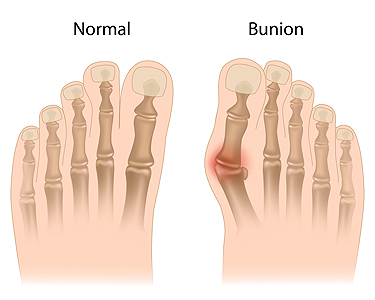
Bunions are a foot deformity characterized by a noticeable bump at the base of the big toe, where it angles towards the second toe. This deformity results from an imbalance in the bones and ligaments of the foot. Symptomscan typically include localized pain, swelling, and redness at the site of the bunion. The affected toe may also become stiff, making it difficult to wear shoes comfortably or walk without discomfort. Several factors contribute to the development of bunions. Genetics play a significant role. If bunions run in your family, you are more likely to develop them. Wearing tight, narrow shoes can worsen the condition by putting pressure on the toes. Other contributing factors can include arthritis and structural abnormalities in the foot. If you are experiencing some of these symptoms, it is suggested that you schedule an appointment with a podiatrist who can diagnose and offer a comprehensive treatment plan.
If you are suffering from bunions, contact Dr. Odin De Los Reyes of Connecticut. Our doctor can provide the care you need to keep you pain-free and on your feet.
What Is a Bunion?
A bunion is formed of swollen tissue or an enlargement of boney growth, usually located at the base joint of the toe that connects to the foot. The swelling occurs due to the bones in the big toe shifting inward, which impacts the other toes of the foot. This causes the area around the base of the big toe to become inflamed and painful.
Why Do Bunions Form?
Genetics – Susceptibility to bunions are often hereditary
Stress on the feet – Poorly fitted and uncomfortable footwear that places stress on feet, such as heels, can worsen existing bunions
How Are Bunions Diagnosed?
Doctors often perform two tests – blood tests and x-rays – when trying to diagnose bunions, especially in the early stages of development. Blood tests help determine if the foot pain is being caused by something else, such as arthritis, while x-rays provide a clear picture of your bone structure to your doctor.
How Are Bunions Treated?
- Refrain from wearing heels or similar shoes that cause discomfort
- Select wider shoes that can provide more comfort and reduce pain
- Anti-inflammatory and pain management drugs
- Orthotics or foot inserts
- Surgery
If you have any questions, please feel free to contact our offices located in Southbury and Farmington, CT . We offer the newest diagnostic and treatment technologies for all your foot care needs.
